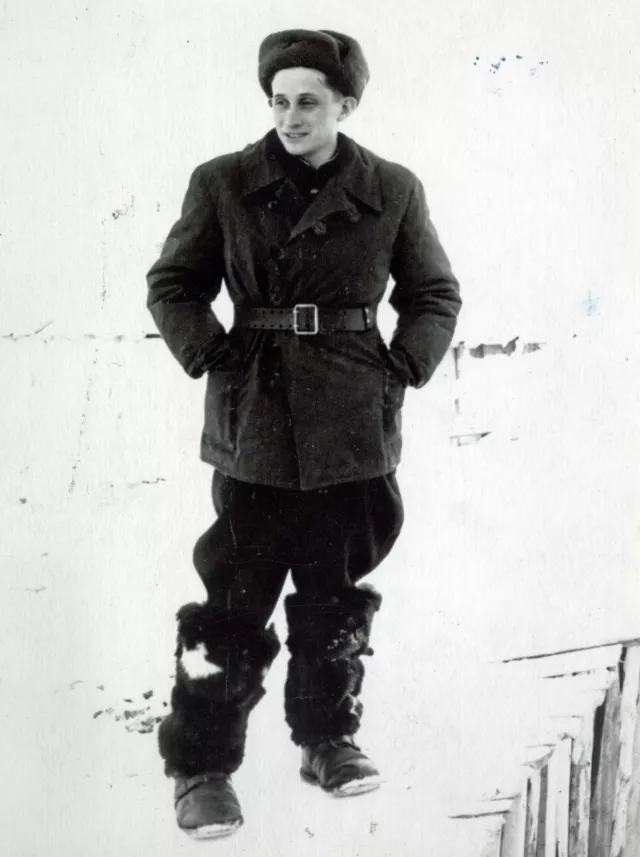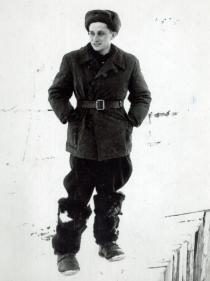This is a photo of me taken during my military service at Pevek in the North in 1955.
I defended my diploma in 1949 and got an assignment as a foreman at the Santechmontazh Department in Minsk. In June 1951 I went into the army. I served at the Aerodrome Construction Regiment in Nezhin, in the Chernigov region. In the summer of 1953 I was transferred to Kiev. From there I was transferred to the Aerodrome Construction Regiment near Pevek village in Chukotka. 1953 was the year of the Doctors' Plot that I believed was a continuation of the campaign against cosmopolitans. The doctor in our unit was a Jew and the situation became very tense. I received a vacation and went to visit Aunt Riva in Leningrad. Riva's husband was demoted and transferred to Leningrad. I arrived in Leningrad on 2nd March. The following day the authorities announced Stalin's ill health and on 5th March 1953 he died. It was a time of mourning. All the theaters and museums were closed. Crowds of people tried to get to Moscow for his funeral. The trains to Moscow were overcrowded, there were people even on the roofs of the trains. For many people Stalin's death was like the end of the world. His death wasn't a tragedy for me. My parents called him 'shister' -- 'bungler' in Yiddish. I didn't have any illusions about him after 1937. We understood very well that he was aware of everything happening in the country. Of course, many people associated the victory over the fascists with the name of Stalin. They forgot about the beginning of the war and about the numerous senseless victims of the regime. I had a feeling of relief when Stalin died. In April there was a publication circulated concerning the rehabilitation of the Kremlin doctors, and I thought the situation was going to improve.
There was a big amnesty after Stalin's death. It didn't cover political prisoners, though. They released from the prisons a large number of criminals. Thousands of these people were at the airport in Pevek. [This is a big town in the north with a prison. There were hundreds of camps and jails in the North with millions of prisoners.] They were waiting at the airport for their turn to take a plane, playing cards and drinking. It was a dangerous situation for the people and the military. The criminals had clashes and hundreds of people were killed in a month's time. The criminals attacked people in the smaller villages. Only one soldier was murdered in our military unit, but in distant military units the number of victims was significant.
At the end of 1954 our unit was transferred to Cape Shmidt. In September 1956 my 3-year term of service in the North was over. I returned to Kiev and went to work at the Yuzhgiprostroy Institute. I got back my former position as senior engineer.
Mark Golub as a soldier
The Centropa Collection at USHMM
The Centropa archive has been acquired by the United States Holocaust Memorial Museum in Washington, DC.
USHMM will soon offer a Special Collections page for Centropa.
Academics please note: USHMM can provide you with original language word-for-word transcripts and high resolution photographs. All publications should be credited: "From the Centropa Collection at the United States Memorial Museum in Washington, DC". Please contact collection [at] centropa.org.















